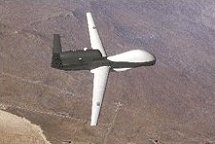The President-elect is unveiling (if that’s the right word) his new economics and foreign policy teams, but an article in the New York Times about robots gives me (to jumble the jargon) a fiercer audacity of hope.
Robots, we are told, are the future of warfare: “For one thing, they can be designed without an instinct for self-preservation and, as a result, no tendency to lash out in fear. They can be built without anger or recklessness . . . and they can be made invulnerable to . . . the psychological problem of ‘scenario fulfillment.’ ”
Let’s not worry about that last one right now; it just means the tendency of humans to be human, and that’s the last thing we want when it comes to warfare.  Already American drones, piloted by personnel in Nevada or somewhere like that, are dropping bombs on (human) targets in Pakistan and Afghanistan and elsewhere. I remember an incident in Yemen a few years ago in which a drone finished off some suspected terrorists (or should that be “unsuspecting terrorists?). Now I learn that robots are being used as border guards in Israel and South Korea. Why isn’t Wal-Mart using them already to guard against shoplifting? Robots don’t need health insurance or pensions.
Already American drones, piloted by personnel in Nevada or somewhere like that, are dropping bombs on (human) targets in Pakistan and Afghanistan and elsewhere. I remember an incident in Yemen a few years ago in which a drone finished off some suspected terrorists (or should that be “unsuspecting terrorists?). Now I learn that robots are being used as border guards in Israel and South Korea. Why isn’t Wal-Mart using them already to guard against shoplifting? Robots don’t need health insurance or pensions.
Best of all, robots can be designed to follow the Geneva Conventions – or not, of course, depending on who’s in charge. One scientist comments that making robots “sensitive to moral considerations will add further difficulties to the already challenging task of building reliable, efficient and safe systems.” Moral considerations always complicate things, especially in warfare, but it can be done.
Daniel C. Dennett, a “philosopher and cognitive scientist at Tufts University,” tells us that, “If we talk about training a robot to make distinctions that track moral relevance, that’s not beyond the pale at all. . . . But . . .letting machines make ethical judgments is a moral issue that people should think about.” Actually, it’s when human beings make moral judgments that I worry, but I’m not a certified philosopher and cognitive scientist.
Of course the best part is that robots don’t bleed. The body parts on the battlefield of the future might be made of teflon. We could even build them with a bottle of ketchup inside for greater realism. And why should we require the generals in the wars of the future to spend their time in Nevada of all places? Surely they could set up shop in some pleasanter place. I’m not anxious to have them in the northwest corner of Connecticut, but one of the new mega-mansions in Greenwich might be suitable. And they could take a break at a nearby Starbucks.
And why should we require the generals in the wars of the future to spend their time in Nevada of all places? Surely they could set up shop in some pleasanter place. I’m not anxious to have them in the northwest corner of Connecticut, but one of the new mega-mansions in Greenwich might be suitable. And they could take a break at a nearby Starbucks.
And best of all, since it’s all very ethical and no one gets hurt, we might for greater convenience invite Osama bin Laden to have his own control panel in an adjacent room or even a separate desk in the same room. And if the ensuing battles drag on for years and years, what better way can you imagine to keep our generals busy?